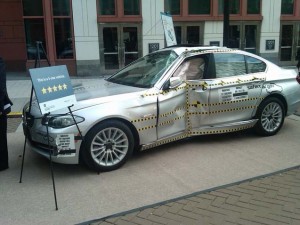
The BMW 5-Series and the Hyundai Sonata were the only models awarded overall 5-star ratings by NHTSA under revised 2011 testing.
While it might seem like just about every carmaker and model, these days, is promoting a 5-star crash rating, things are about to get tougher – a lot tougher, as the industry is learning. Only two models from two makes have met the even more stringent 5-star target under the newly-revised federal safety evaluations.
For the coming 2011 model-year, the National Highway Traffic Safety Administration is rating 55 new models, including 20 SUVs, 24 passenger cars, two vans and nine pickup trucks. So far, only two have been able to achieve an overall 5-star rating: the 2011 BMW 5-Series and the 2011 Hyundai Sonata.
That’s a potential significant advantage in a market that has become increasingly sensitive to safety-related issues where makers compete to show who has the most airbags and the latest computer-controlled safety systems.
“The performance of the new 5 Series in these tough new tests reflects BMW’s long-held belief in a holistic approach to vehicle safety that places equal emphasis on active and passive safety,” Jim O’Donnell, President of BMW of North America, said in response to the NHTSA announcement.
Under the revised 2011 ratings system, NHTSA assigns between 1 and 5 points to each vehicle depending upon how well it survives a frontal crash, with similar scoring used for side impacts and rollover risk. The numbers are combined and adjusted to provide an overall score of 1 to 5 stars.
There are, in fact, a number of changes for 2011. Federal regulators are now using a side-impact pole crash test that attempts to better simulate real-world accidents. And a new female crash dummy will be used in the revised testing process. The result, the government anticipates, is that far fewer models will achieve the maximum 5-star rating.
In terms of the frontal crash test, only three large GM SUVs earned top rank: the Cadillac Escalade, Chevrolet Tahoe and GMC Yukon.
Among those getting an overall four stars were the Ford Taurus, Chevrolet Malibu and two models from Subaru: the Legacy and Outback.
Perhaps the bigger surprise was the relatively mediocre performance of the Toyota Camry, the midsize sedan earning just 3 stars overall. Considering the maker’s well-financed ad campaign which aims to overcome the damage of its year-long safety scandal, the news could prove to be another unwanted setback.
(Toyota will put brake interlocks on all 2011 models. But the maker has been sued by insurance giant Allstate in connection with its sudden acceleration problems. Click Here for more.)
The 2011 revised NHTSA testing procedures now also take into consideration the use of advanced safety systems, such as anti-lock brakes, stability control, and other technologies that the government is now endorsing. Stability control, for example, will shortly become a required feature under federal law.
